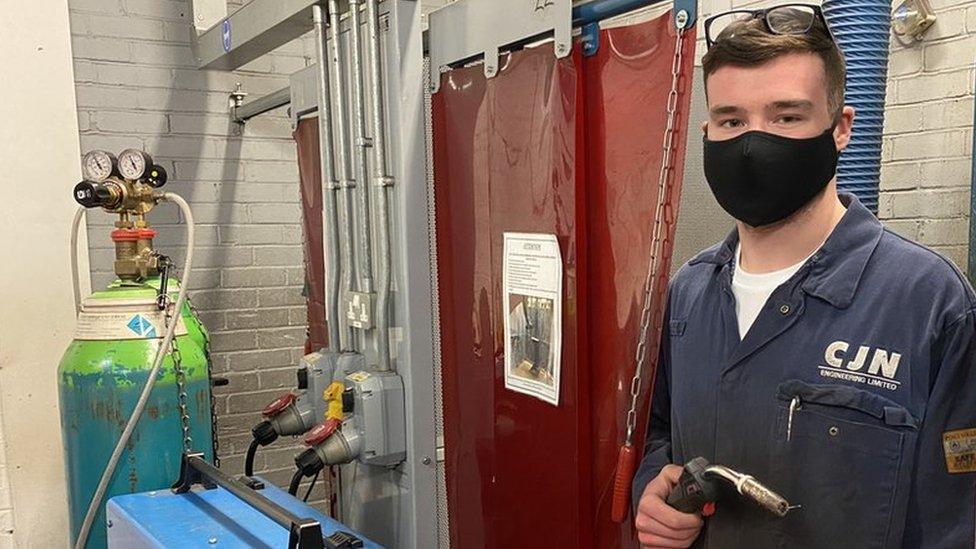GCSEs: Top grades show sharp increase on 2019
- Published
GCSE students have been celebrating their results
The number of top grades given out at GCSE in Wales has increased for the second year running, according to the official results published on Thursday.
A total of 28.7% A and A* grades were awarded, compared with 18.4% when exams were last held in 2019.
Grades were decided by teachers after exams were scrapped due to Covid-19.
The education minister said pupils had shown "tremendous resilience" to overcome the pandemic's challenges.
Meanwhile 73.6% achieved at least C grade or above, roughly the same as 2020 but again a sharp rise on 2019.

Elin got a clean sweep of top grades, despite a busy home
Despite being at home with "a house full of children running around", Elin, 16, got 12 A* grades at Ysgol Glan Clwyd in St Asaph.
She said she felt overwhelmed, adding: "I'm one of six, which made it much harder and a lot more stressful.
"But I got through it."
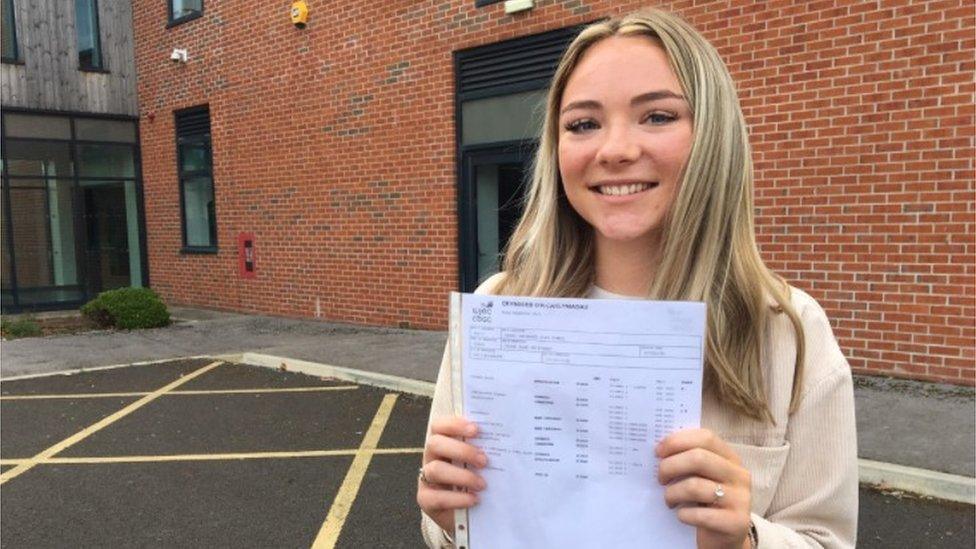
Alaw said it had been a difficult year but was happy with her grades
Her fellow pupil at the Denbighshire school, Alaw, also 16, said: "It's been a challenging year, getting the motivation to get out of bed, on the laptop and do the work."
She said she preferred going to school and missed the social side of it, but was happy with her grades - two As, five Bs and four Cs.
Qualifications Wales said it had been a "difficult year for everyone in education".
But chief executive Philip Blaker added: "Learners can be confident that the qualifications awarded in Wales this year carry the same value as qualifications awarded in any other year."
It is a similar pattern to the higher grades seen on Tuesday, when almost half of A-level results were A*s and As.
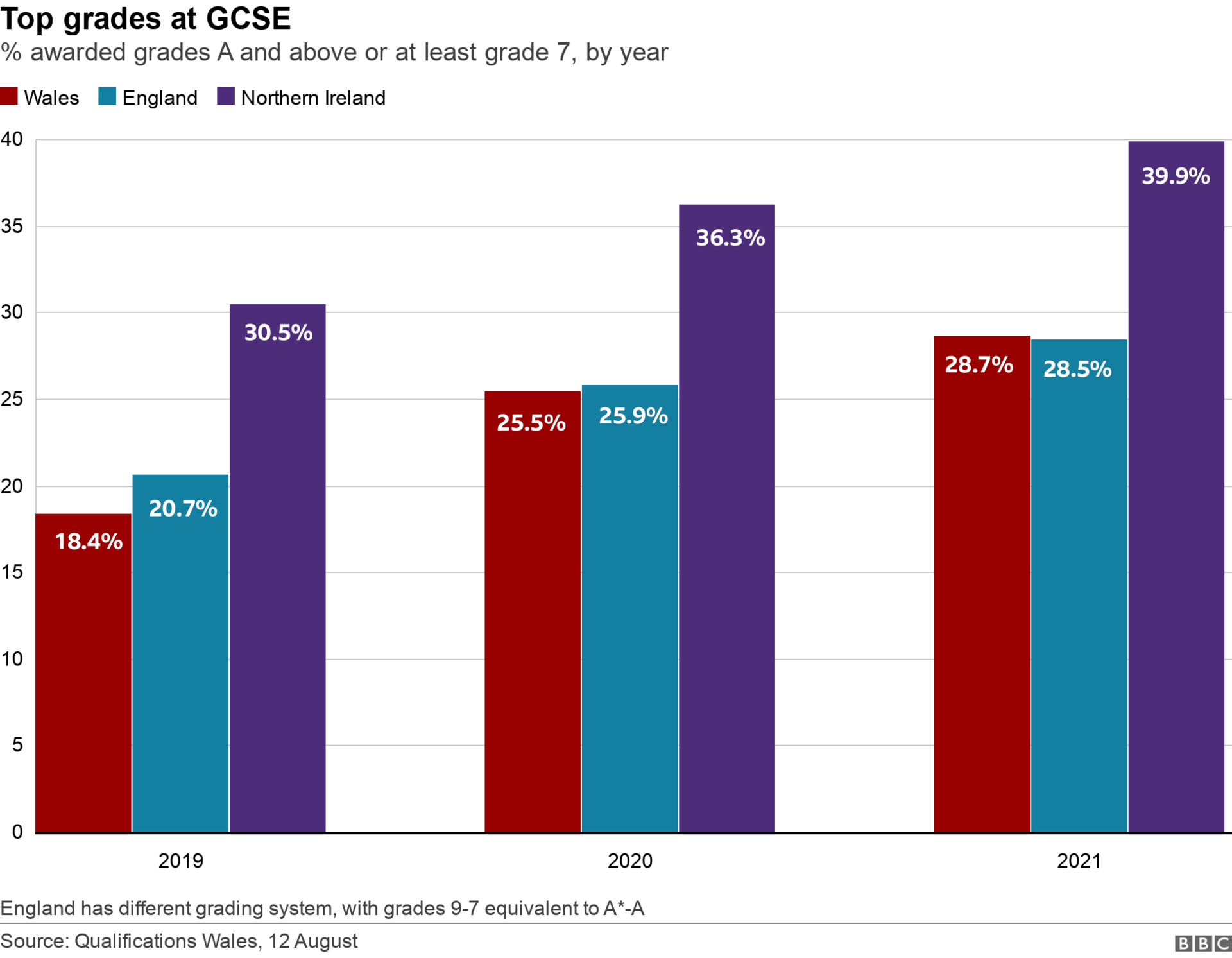
Wales overtook England for top GCSE grades, although the system is different.
The exam results also showed:
There were 328,658 summer GCSE entries this year, a rise of 8.6% compared to 2020
73.6% achieved C grades or above, compared with 73.8% in 2020 and 62.8% in 2019
98.5% achieved at least a pass of G, compared with 99.6% in 2020 and 97.2% in 2019
Of the learners who sat the National/Foundation Skills Challenge Certificate, 19% achieved A* or A, up from 14% two years ago.
Education Minister Jeremy Miles said: "My message to this year's GCSE students is a huge 'well done'.
"You've had everything thrown at you over the last 18 months - periods in lockdown, time away from your friends and families, and times where you've missed out on many of the social activities you should be enjoying."
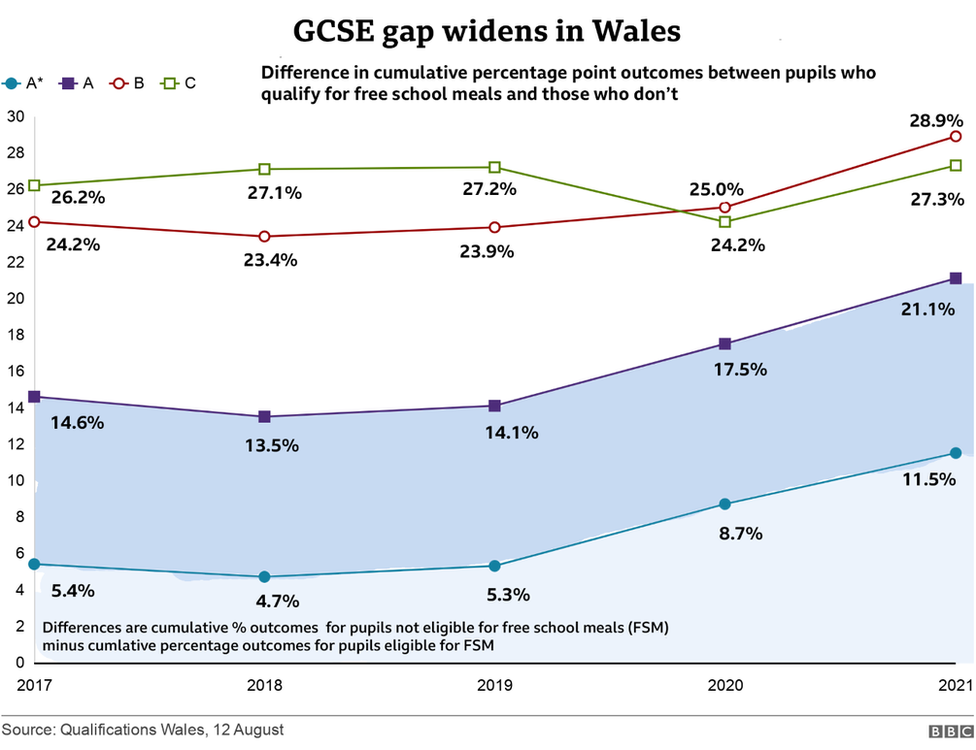
Widening gap for pupils from poorer backgrounds
There is a widening gap at the top grades between students from poorer backgrounds and others. There was a 11.5 percentage points difference at A* between those who were eligible for free school meals and those who do not.
This has grown by 2.8 percentage points on last year and has widened by 6.2 percentage points on 2019.
Qualifications Wales said a similar pattern was observed at A*-A, while the A*-C attainment gap also widened in 2021.
So, 52% of pupils who were eligible for free school meals got grades between A* and C, but that rises to 79.3% for pupils not eligible - the gap growing to 27.3%, when it had narrowed slightly to 24.2% the year before.
Speaking on BBC Radio Wales, Mr Miles said there had been "considerably better achievement for all groups of learners".
But he said there was "clearly" an attainment gap: "Covid has had an impact on that and we can see that in some of the results."
"For the next school year we've got significant sums of money to help schools respond to the impact of Covid" which will be focused on "disadvantaged learners", he added.
More boys getting top grades
Boys achieved 10.7 percentage points more A grades than girls, up from 9.5 percentage points in 2020 and 7.4 in 2019.

Students this year received their provisional results back in June, so that they had the option to appeal their grades before they were finalised.
Both the provisional and final grades were decided by teachers, and so there will likely be less variation than previous years when exams played a significant role.



Talking percentages and grades up or down is familiar on results day, but in a pandemic, inevitably, it is all about the context.
In the absence of exams, teachers determined grades and, like A-level results, they have been higher than when exams were last held in 2019.
So do the Wales-wide GCSE results tell us anything useful?
Not really about relative performance with other years, but there's plenty to un-pick.
The spike in the last two years' figures will colour discussions about how the expected transition back to exams happens next year.
And then there's the attainment gap between disadvantaged pupils and their classmates - always significant but even bigger under this year's system.

What has been the reaction?
Conservative education spokeswoman Laura Anne Jones paid tribute to the "tremendous work" of pupils and said it was now important that the Welsh government outlined the roadmap for the new academic year and "provided clarity for teachers, pupils and parents".
Laura Doel, director of the head teachers' union NAHT Cymru, said: "We should all have the confidence that these results were awarded through a rigorous evidenced-based process by the people who know them best academically - their teachers.
"We cannot underestimate the role of schools in this process and our whole education workforce should be commended for all they have done to support learners."
David Evans, Wales secretary of the National Education Union Cymru said the circumstances had been "exceptionally challenging."
He added: "For next year, we need a back-up plan in place, to avoid a repeat of the chaos and significant unnecessary workload, pressure, and stress experienced this summer."

Exams 'have a place' in future
Before results were published on Thursday morning, teaching union Ucac said there were "huge questions" about whether "a barrage" of formal exams at 16 was now necessary.
But exams "definitely have their place" in assessing pupils in future, Qualifications Wales said.
David Jones, chairman of Qualifications Wales, disagreed and insisted examinations should remain part of a range of assessment methods.
He said different forms of assessment had been developing over recent years and this had increased during the pandemic.
He added that there was an "unique opportunity" as part of the new Welsh curriculum to look at new approaches, but experience of exams was important.
"A lot of learners, but not all learners, go on to university and higher education and they do examinations at university," he said.
"I think we would be letting them down if we didn't give them some preparation for examinations by doing them at schools and colleges and, of course, many of our learners move on from degrees to do professional qualifications."
Qualifications Wales said exams, alongside other forms of assessment, "remain the fairest way to assess a learner's level of attainment".
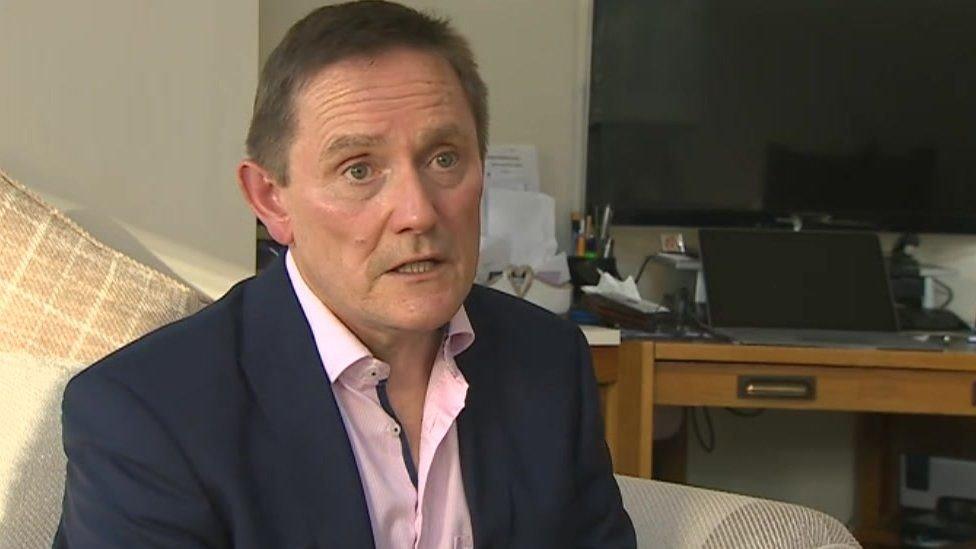
David Jones says exams still have a part to play in schools in future
Louise Casella, director of the Open University in Wales, chaired an independent review into what went wrong with the awarding of qualifications last summer, which also made some broader recommendations.
She said the group believed exams were not "the be all and end all" and any system should give pupils "the very best opportunity to show what it is they've learned".
"I think we all have visions of exams as being lined up in exam halls, desk behind desk - it doesn't have to be that way," she added.
While agreeing there was a place for "some common assessment of learning" she said there should be "multiple points of reference throughout the year".
Qualifications at 16 are being looked at as part of the new curriculum being rolled out from 2022, with the first new-look GCSEs to be completed in 2027.
Qualifications Wales said the GCSE brand should be kept, but it has been consulting on how exactly they will work.
Plaid Cymru said last year it would scrap GCSEs and replace them with a system based on teacher assessment.
The Conservatives said they believed exams remained "the fairest and best form of assessment" and hoped to see them return as soon as practically possible.
Teachers' union Ucac said "removing, or significantly reducing" GCSE requirements would free up time for learning and minimise stress on young people.
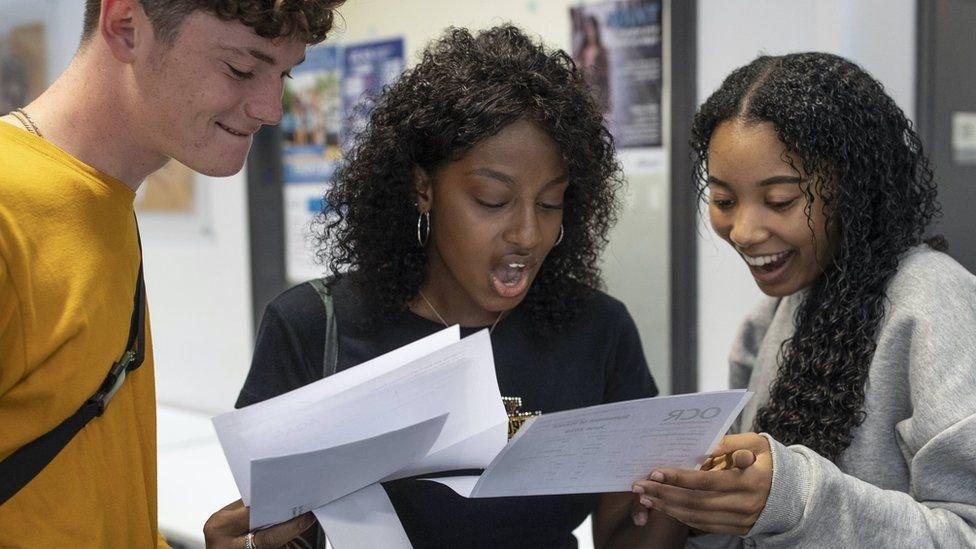
Teacher-assessed grades have attracted controversy
"There are huge questions about the purpose and suitability of GCSEs," the union's deputy general secretary Rebecca Williams said.
"It's not at all clear that a barrage of formal, external exams at 16 is necessary any more".
She said the new curriculum meant "a major change to the GCSE system is needed".
David Evans, Wales secretary for National Education Union Cymru, said there were already some elements of coursework at GCSE.
"It is arguably a better and fairer reflection of someone's capabilities to take a holistic view of what they know and can do, than to take a snapshot through exams", he said.
"But any changes need to have plenty of time and resources, to ensure we don't increase the workload for staff and students alike."
- Published12 August 2021

- Published1 July 2021

- Published24 March 2021
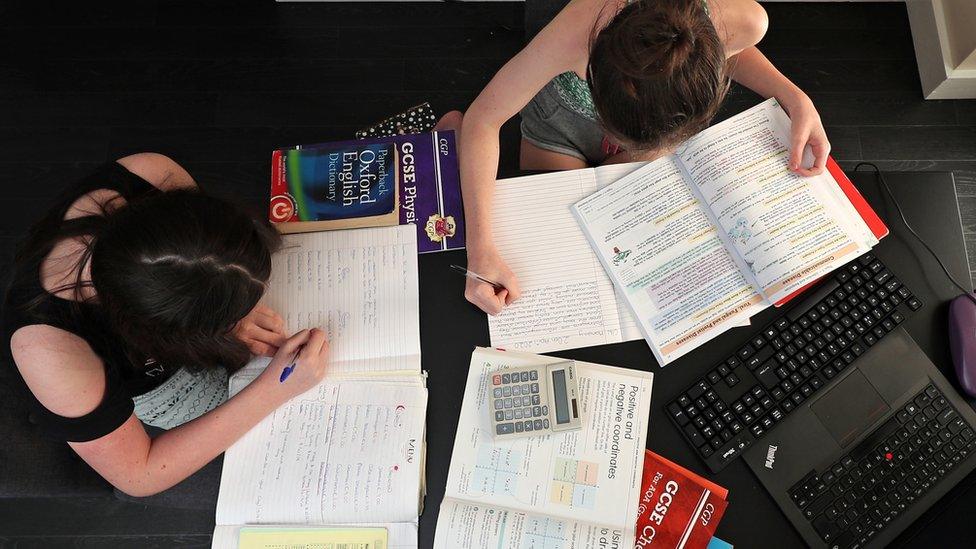
- Published25 February 2021
